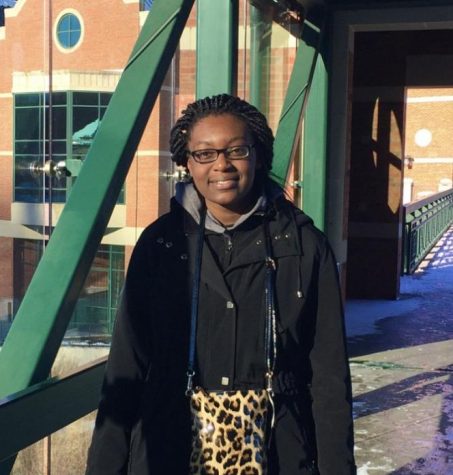Composting brings another layer of sustainability to campus
March 5, 2020
The importance of recycling is taught in multiple industries, but not like App State: faculty and students are using compostable items to live sustainable lives on or off campus.
Freshman Anna Bradshaw served as an eco-representative in Eggers Residence Hall. She helped students stay informed about composting through advertising.
“Using compostable material is beneficial for the Earth than Styrofoam plates for example. Styrofoam will never go back into the Earth, it will stay Styrofoam for the rest of its life,” said Bradshaw, a sustainable development major. “If you use a compostable plate like the ones we use in the dining halls, it will turn back into the soil. That plate’s footprint will be gone, meaning it won’t stay forever or cause any pollutants.”
According to the Green Dining Alliance, plastic foam is made of styrene. Individuals who live and work in environments with high concentrations of styrene have higher instances of cancer, neurological issues, headaches, depression and fatigue.
Plastic foam is impossible to discard. It lingers into the soil and erodes into the ocean, creating serious problems.
Jennifer Maxwell, Sustainability program manager, partners with on-campus facilities like dining halls and housing. Under the Office of Sustainability, she manages programming on campus.
Composting was only available in Belk, Frank and the Living Learning Center at first, but later shifted to all residential halls. They also didn’t have an eco-rep in every residential hall until the policy changed.
“We’ve done this since 2015, this gives us the ability to have a representative or liaison through our office from every residential hall. The responsibility of eco-rep is mainly composting and getting people involved in Green Apple certification programs,” Maxwell said.
Composting is the process of decomposing organic matter and using waste products to produce rich nutrients in the soil. Composting surpasses plant diseases and pests and reduces the need for chemical fertilizers.
“Composting is a lot like recycling, it’s the recycling of organics. Anything that was alive or made from something alive like your paper products. It’s a way to recycle those materials back to the earth,” Maxwell said. It’s a natural process, so you’re using air and water.”
Maxwell said composting is like raking leaves into a pile. After a certain period of time, those leaves break down and go back into the Earth.
“We compost in a controlled environment, so we have a facility here on campus. We’re a large-scale composter so we are permitted through the state of North Carolina. We collected any leftover food, paper products or pizza boxes, etc,” said Maxwell.
She said the facility uses a recipe in the mixing process of composting.
“You’re given a certain carbon and nitrogen ratio. The nitrogen is food waste or grass clippings, so the green stuff. Carbons are brown, so leaves, wood chips, or paper. You have to have a certain percentage of nitrogen or carbon into for the process to happen,” Maxwell said.
Maxwell said it takes nearly 14 days to break down the material, then brew it for 6 months. “In our facility, we collect runoff water in a holding tank and give that tank oxygen to keep those microorganisms alive then we throw that water in the pile,” Maxwell said.
Graduate student Grace Schmidt works at Wired Scholar and Crossroads, and believes composting is better than recycling.
“Composting is more sustainable than recycling. Recycling is great, you can reuse plastic or glass. With compost, you can make things out of it. I think it’s more renewable,” said Schmidt, who studies reading education.
Before the coffee shops became a part of Campus Dining, they strived to be sustainable, but their efforts didn’t expand until they partnered with App State. “We have more compostable products like all of our silverware, our plastic containers for sandwiches and we’re trying to use more compostable single-use products,” Schmidt said. “Most of our food is through App State now.”
Schmidt runs the social media accounts for the coffee shops and uses the platform to spread awareness about composting. She also uses the TV screens in the shops to display composting information.
“Composting is important because so much food gets wasted, and many compostable products get pushed into landfills or people throw things away that can be recycled as well,” Schmidt said. We need to stay away from that, and we want our Earth to remain beautiful.”
Bradshaw and Schmidt said they feel App State isn’t doing enough to spread information about composting.
“I think the school can be better, we say we are a sustainable campus but so many people don’t even know that they can compost or that we have one,” Schmidt said.
Bradshaw said she feels like it’s important to educate our students because the composting bins are not used properly. Bradshaw said as eco-rep, she would sort through the compostable bins and put out items that don’t belong there.
“I didn’t think that people didn’t care until I became an eco-rep. The Office of Sustainability and the sustainable development department try really hard to spread the word,” Bradshaw said. “The higher authorities at App State, they don’t take as much initiative to be a sustainable campus as I initially thought.”
Maxwell said she understands the lack of knowledge students have about composting and works to aid students in a sustainable direction during their time at App.
“We try really hard to get the word out. We color code our bins and signs and make it more constant campuswide. We have our student team, ambassadors who do outreach and try to bring awareness to all things sustainably. They focus on our waste education,” Maxwell said.
For more information, visit the Office of Sustainability.











